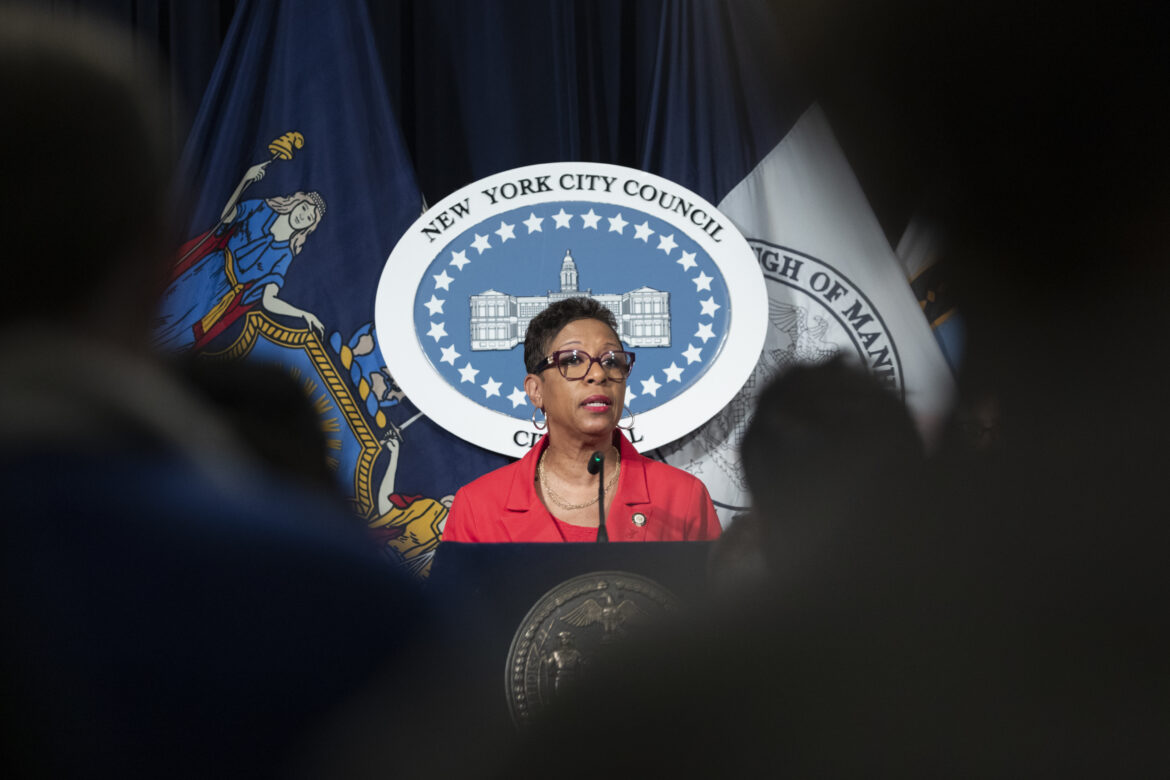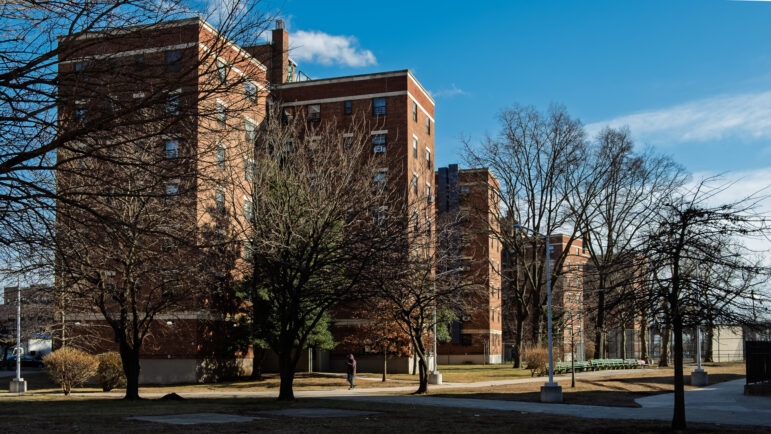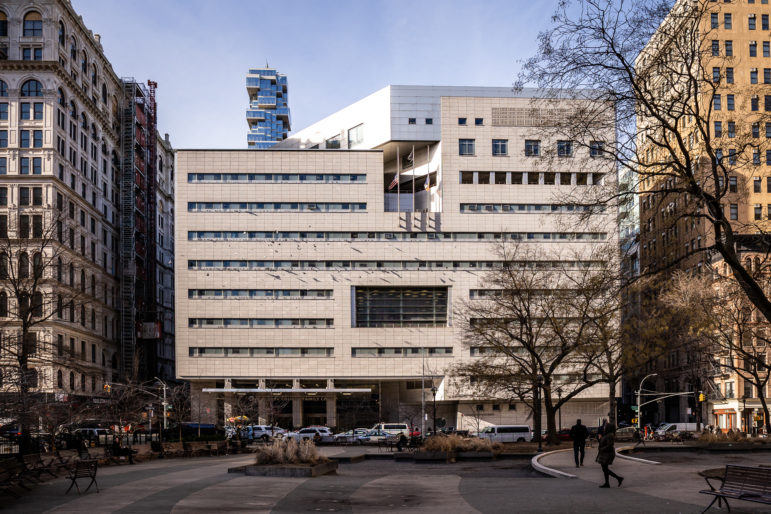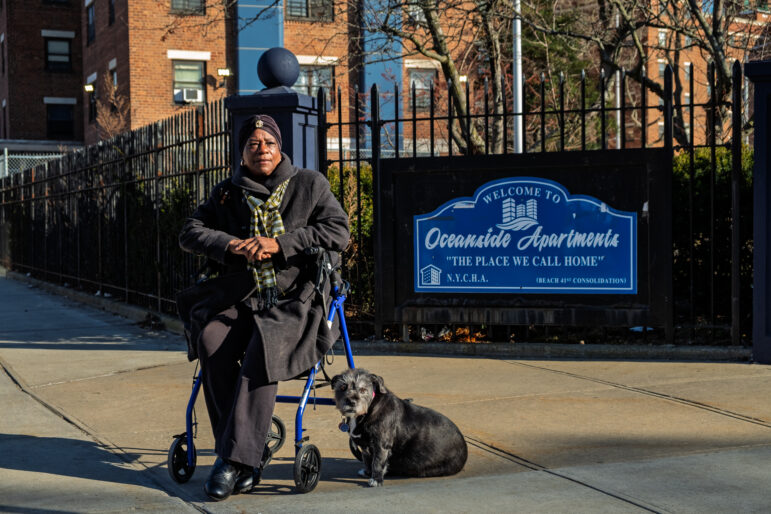Council Speaker Adrienne Adams slated two days of public meetings, for Oct. 21 and 22, where lawmakers will probe the Adams administration’s zoning reform package. She also announced the Council’s intention to put forth its own “thorough housing action plan,” as part of the final negotiations.

Emil Cohen/NYC Council Media Unit
Council Speaker Adrienne Adams.Mark your calendars: the public will have another chance to weigh in on the mayor’s City of Yes for Housing Opportunity plan, as it heads to a final vote before the City Council this fall—and lawmakers are looking to see more from the proposal.
Council Speaker Adrienne Adams on Tuesday scheduled two public meetings, for Oct. 21 and 22, where members will probe and gather input on the Adams administration’s zoning reform package, which aims to make it easier to build across the city. She also announced the Council’s intention to pursue its own “thorough housing action plan,” as part of the final negotiations.
“We recognize that zoning reform is one important component to address the housing shortage facing New York City. Yet, zoning reform alone is not a housing plan and cannot address the wide-ranging housing needs of New Yorkers,” Adams said in a statement.
“Addressing the housing crisis requires more than just changes to zoning—it demands holistic solutions to make homes affordable, strengthening tenant protections, removing barriers to housing vouchers, expanding pathways to affordable homeownership, strengthening agencies’ capacities, and investing in neighborhoods,” she added.
The speaker’s comments echo some of the concerns aired about City of Yes for Housing during its public review so far. The plan would update decades of zoning rules that supporters say are overly restrictive and make it hard to build new homes, fueling a severe housing shortage. But critics say it doesn’t do enough to address affordability.
Winning the Council’s approval is the final hurdle for the proposal, and comes during an intensely turbulent time for Eric Adams’ administration. The mayor was indicted late last month on federal corruption and bribery charges, accused of accepting illegal campaign donations and travel perks from Turkish nationals.
Several of his top officials have had their phones seized or homes searched by investigators and a number have stepped down, including First Deputy Mayor Sheena Wright, who was replaced Tuesday by Maria Torres-Springer, currently the deputy mayor for housing, economic development, and workforce (a role she’ll maintain, the mayor’s office said).
“We will continue to push the City of Yes,” Mayor Adams said Tuesday when announcing the staff shakeup. “We think it’s imperative that this issue is voted on.”
It’s not unusual for councilmembers to negotiate changes and concessions in exchange for approving major land use plans. When the Council passed a rezoning this summer for two areas of the Bronx around new Metro-North stations, for instance, the final deal included $500 million to upgrade local parks and schools. In voting on a plan to rezone a swath of Gowanus in 2021, lawmakers demanded repair funds for nearby NYCHA campuses.
“While reviewing the Administration’s zoning proposal, the Council will put forward a thorough housing action plan for our city that matches the scale of the housing challenges facing New Yorkers,” Speaker Adams said Tuesday, saying that plan will include “a full range of solutions.”
Unlike neighborhood-based rezonings, City of Yes for Housing doesn’t change any local zoning designations, instead making changes to the zoning code itself to boost potential housing production citywide. It would make it easier to build accessory dwelling units, shared housing models, office-to-residential conversions and infill buildings on educational or religious campuses.
It would allow apartments to be built above stores in low-density areas where that has since been prohibited, and for the construction of larger buildings—ranging three to five stories—near transit hubs. The plan would also do away with minimum parking requirements for new development, and offer a 20 percent density bonus for developers in certain neighborhoods, as long as the extra housing is income-restricted.
Public review for the proposal kicked off in April. Four out of the city’s five borough presidents weighed in favorably, while community boards have been split (check the City Limits’ maps below to see how each voted). The City Planning Commission approved the plan in late September, with a vote of 10-3.
The City Council’s Subcommittee on Zoning and Franchises will hold the first public meeting on City of Yes for Housing on Oct. 21, in which Adams administration officials will testify and answer councilmembers’ questions. A second hearing on Oct. 22 will be reserved for public feedback.
To reach the reporter behind this story, contact Jeanmarie@citylimits.org.
Want to republish this story? Find City Limits’ reprint policy here.









One thought on “City Council to Probe Mayor’s City of Yes for Housing Plan”
Outer Boroughs opposed to City of Yes! – http://u.pc.cd/PyLctalK
Adams City of Yes means – ‘…FORCING low-density neighborhoods to accept more housing…’ – http://u.pc.cd/VFrctalK
Forcing out NYC homeowners is the goal of City of Yes – http://u.pc.cd/Y2e
Hobbled Mayor Adams means end of City of Yes – http://u.pc.cd/l6lrtalK
Queens Councilman Holden wants inquiry into City of Yes – http://u.pc.cd/CHF